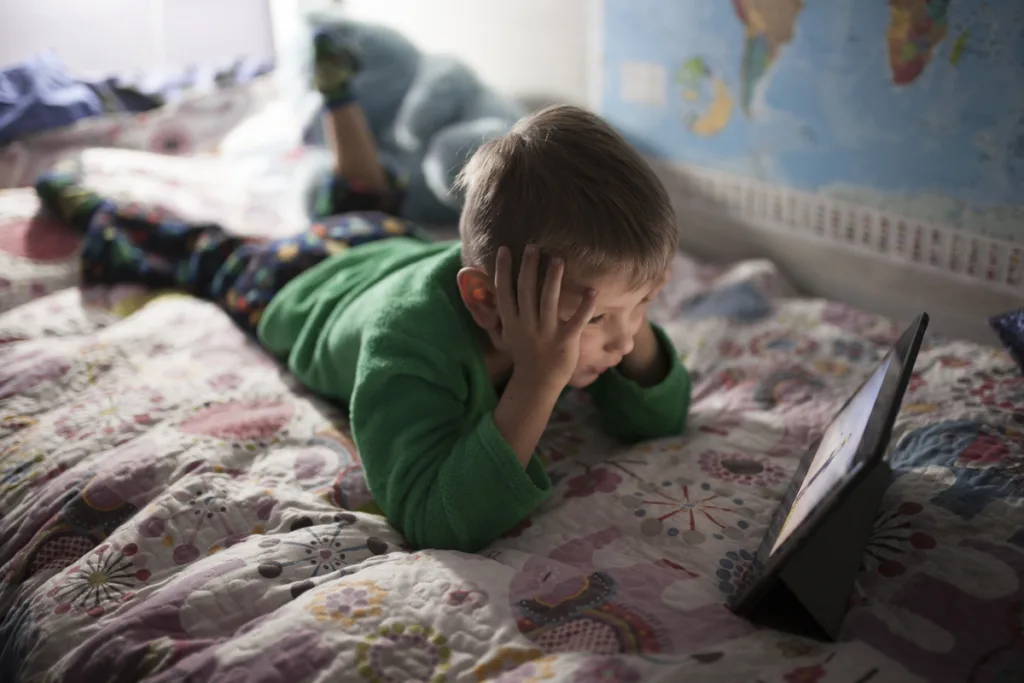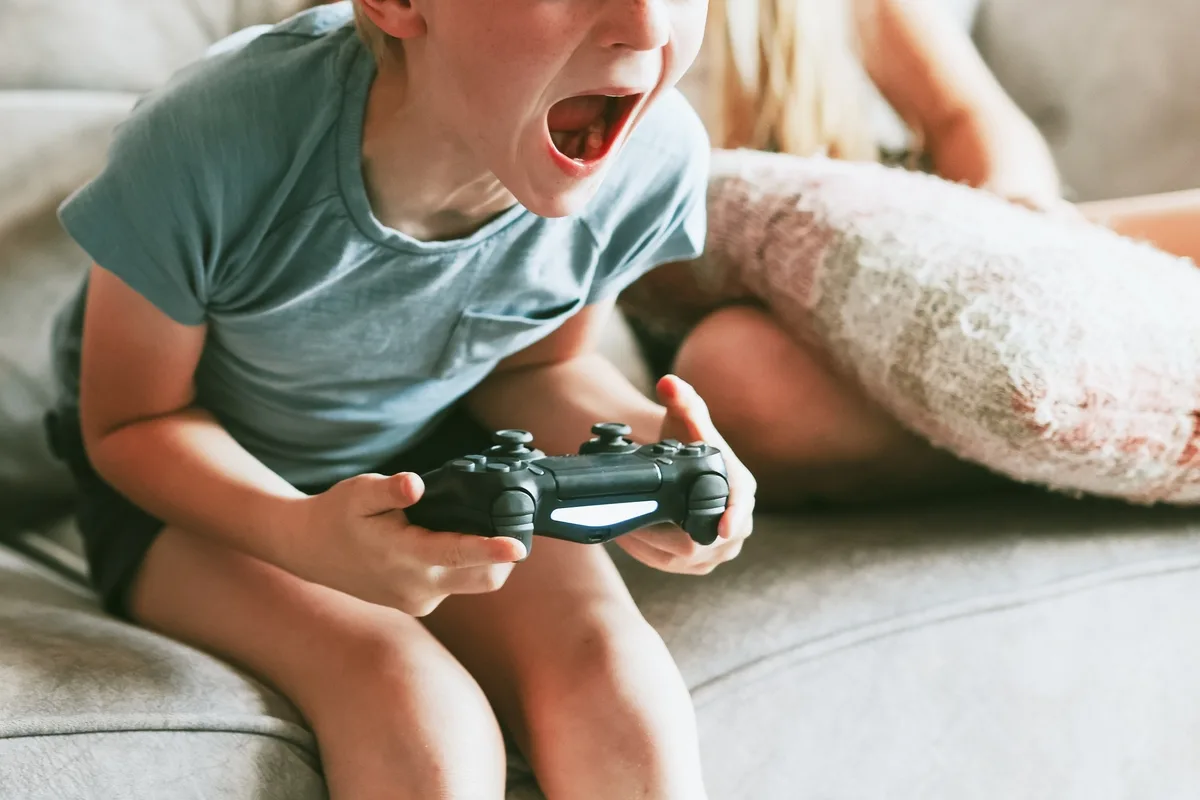Technology provides some benefits for cognitive and social development. With guidance, children can learn and connect with others meaningfully. At the same time, when we let them navigate freely, they might not know what to do in the tangled world of the Internet. Without proper boundaries, video game playing can affect children’s daily activities. Discover the potential negative effects of video games and explore strategies to reduce them for a more balanced experience.
Understanding the Negative Effects of Video Games
Excessive screen time can lead to many negative consequences on child development. In the early years, it can interfere with critical milestones. It can impact their attention span, increase their anxiety, and decrease interest in school or social activities.

Credit: Freepik
The American Academy of Pediatrics offers age-specific recommendations. It’s advised to keep screen exposure only for video calls with the family when the child is under 24 months. For older children, the main worry is about the negative effects of video games on their internal motivation. This means that unrestricted and unsupervised screen use can lead to sedentary behavior. This can impact their physical health, sleep patterns, and school performance.
Overview of Negative Effects on Child Development
The catchy, fast-paced, and interactive nature of digital content and online games can cause the real world to seem dull.
The instant feedback that screens offer – such as likes, comments, or going to the next level in a game – can make children crave immediate rewards. It can also result in diminished patience for activities that need sustained effort and time to yield results. Learning a musical instrument, mastering a sport, or doing schoolwork might look boring, useless, or hard when video games are available as an alternative.

Credit: Freepik
Furthermore, the captivating world of screens can also limit children’s face-to-face interactions and add to the negative effects of video games. Their ability to be patient and empathetic is affected. Their social and negotiation skills might decline. All these important social skills aren’t always necessary in the virtual world but are vital in real life.
Too much screen time also points to a sedentary lifestyle. Screens turn us into couch potatoes, increasing the risk of obesity and other related health conditions.
Negative Effects of Video Games on Mental Health: Video Game Addiction
Find out how video games affect the brain negatively, in order to protect your child. Without restrictions and supervision, children might come across inappropriate content. They may engage in risky online behavior or develop unhealthy attachments to screens. Kids might develop addictive behaviors when they rely on digital devices for entertainment, comfort, or escape.

Credit: Freepik
This is particularly true for gamers, who may find the immersive nature of games alluring, leading to a condition known as ‘gaming disorder.’ This leads to a lack of control over their video game use, making them prioritize playing over other interests or daily activities.
A 2023 study showed that excessive exposure to violent video games can trigger aggressive behavior in children. Exposure to violent and antisocial game images may desensitize them from this behavior. It can make children more likely to exhibit similar behavior in real life.
In other scenarios, they might start comparing their lives with the often unrealistic images they see online. The inability to discern can make them develop feelings of inadequacy, low self-esteem, anxiety, and depression. The negative effects of video games on mental health can be avoided, but as a parent, you have to be very vigilant and reduce the time your child spends playing.
👉 If you want to read more about video game addiction, explore our article ‘Level Up Your Parenting: Tackling Video Game Addiction in Your Child – Causes & Solutions.’ Click here to gain insights and strategies to address this concern effectively.
Negative Effects of Playing Video Games on Brain Function
Why does too much technology lead to shorter attention spans? Scientists believe it’s because kids have to switch their attention back and forth when using devices and playing video games.
Information comes quickly and needs immediate action in video games. Too much screen time can affect how children’s brains react and develop. It’s known to impact areas of the brain that handle visual processing, empathy, attention, and memory.
One of the most concerning negative effects of video games is that they make our kids inattentive.
Scientists found a correlation between frequent digital media use and attention problems in children. This can be particularly harmful during school-age years when maintaining focus is essential for learning and processing information.
Offline activities like reading and playing interactive games in a team require more focused attention. These types of activities help kids develop patience, creativity, and imagination.
When interacting with different objects or activities, kids use multiple senses. This helps them form strong memories and acquire superior thinking skills. Scheduled and limited screen time is a healthy approach. Kids need to spend time on traditional play and sensory learning activities.
The Role of Reward Systems in Video Games
The success of video games comes from their ability to captivate players and create engaging experiences. The game’s reward system is the most powerful mechanism, keeping us hooked. Dopamine, a chemical released in the child’s brain, makes players experience pleasure when accomplishing a game task. Rewards such as leveling up, finding treasure, or defeating an enemy can trigger dopamine release, creating a sense of joy and satisfaction.
These are stimuli that keep players immersed and continually seeking more rewarding experiences. Since it’s a natural process driven by the Need for Competence, it’s not entirely bad. It’s the same driving force that motivates professional athletes to keep going. It becomes troublesome when the child shows signs of poor impulse control. Those moments when they get angry if they lose at a game or are not allowed to play. Inattention is another common effect. Children can get distracted or unresponsive, thus interfering with other daily activities.
The Link Between Video Game Rewards and Restlessness in Children
In gaming, every completed mission or defeated enemy is instantly rewarded. This takes us to other negative effects of video games. Real life often asks for patience, hard work, and resilience to achieve desirable outcomes, and these outcomes do not always come with an immediate reward or a ‘dopamine rush.’ This discrepancy can make reality seem less exciting compared to the gaming world. It may also lead to restlessness in tasks that don’t offer immediate feedback or reward.
Understanding Restlessness in Children
Restlessness manifests as an inability to stay still or focused. This often disrupts the child’s daily activities, school work, and social interactions. This condition is typically observed in children below twelve years old. Symptoms usually become present between the ages of three and six. A child’s surroundings, full of stimulations and distractions, can heighten their restlessness. Busy homes, crowded classrooms, or high-stress situations may stimulate the condition.
Childhood restlessness presents various symptoms that range from mild to severe. The most common negative effects of playing video games include:
- continuous fidgeting,
- difficulty remaining seated,
- trouble focusing on one task,
- acting without thinking.
Too much screen time can over-stimulate children, reducing their capacity to self-regulate. It can increase restlessness and hyperactivity and disrupt children’s sleep patterns.
Impact of Video Game Rewards on Restlessness
Many games also employ external motivators to keep players engaged. These may include leaderboards, achievements, badges, and social recognition. What can compete with this instant sense of accomplishment and prestige?
These rewards, combined with vibrant graphics, immersive narratives, and captivating sound effects, create an irresistible gaming environment. Players are often hooked to play more. They are driven by the motivation to unlock rewards and improve their standing within the gaming community.
The downside? Kids may become restless and impatient in real-life situations where rewards are not as immediate or guaranteed.
Studies have shown that procrastination is a common effect of excessive gaming, illustrating how video games affect the brain negatively. Children may choose to delay or neglect their homework, chores, or other tasks. Over time, this behavior can become habitual, leading to chronic procrastination, which can seriously impact a child’s academic performance and productivity.
Behavioral Patterns and Lack of Focus
Children used to the quick, reward-driven world of video games may struggle to maintain focus during tasks. For instance, activities like reading a book, playing a board game, or going on a family walk can seem dull in comparison to the excitement of a video game.
This is why some children start to show symptoms common to attention-deficit hyperactivity disorder (ADHD), although not previously diagnosed.
Strategies to Reduce the Negative Effects
“But all my friends are allowed to play video games!”
Do you get this a lot? The attitude shouldn’t be towards banning video games completely. It is essential to balance them with real-world experiences. Encourage outdoor activities more often. Nurture relationships and plan family outings. These experiences will enrich their childhood and equip them with valuable life skills.
1. Setting Limits and Monitoring Game Time
Parents can manage their child’s gaming habits and control the negative effects of video games with simple changes. The first step is limiting the amount of time kids can spend playing video games and their internet use. This will ensure they have enough time for homework, physical activities, and socializing with family and friends.

Credit: Freepik
Second, parents should know what their child is playing. Not all video games are suitable for all age groups. Some games contain violent or explicit content that is inappropriate for younger children. The Entertainment Software Rating Board (ESRB) rates video games based on their content, helping parents decide what games suit their children. Avoid letting your child play violent video games, as research has shown a correlation between exposure to these kinds of games and aggressive behavior.
2. Promoting Alternative Activities
While screens are becoming the default mode of entertainment, there is a growing need to create alternative experiences for children that are enriching, enjoyable, and beneficial for their overall development. Here are a few ideas:
- Encourage your child to participate in outdoor activities like playing in the park, gardening, or simply walking around the neighborhood. These activities help children connect with nature and boost their physical health. Create a ‘nature scavenger hunt’ or create a mini garden to make these experiences more engaging.
- Facilitate playdates or enroll them in clubs or community activities where they can meet and interact with other children. These social experiences teach them valuable skills like empathy, cooperation, and conflict resolution.
- Involve your child in tasks like cooking, cleaning, or gardening. You can create a game out of sorting laundry or a competition to see who can tidy up the fastest. This teaches children responsibility and life skills and makes them feel valued as contributing members of the family.
- Encourage your child to pursue offline passions, whether painting, playing a musical instrument, or participating in a sport. These activities help children discover their interests, develop discipline, and boost their self-esteem. Sports, in particular, are excellent for teamwork, resilience, and keeping in good health,
- Plan activities such as bike rides, camping trips, museum visits, or picnics. These shared experiences are great for family bonding. Remember, the focus should be on spending quality time together rather than the activity itself.
👉 Concerned that not only video games but also excessive TV and tablet/phone use can be harmful for kids? Discover whether parents should limit screen time and how to prevent screens from becoming ‘the babysitter’ in just 3 steps.
Video games and other digital tools can supplement learning and cognitive development but cannot replace physical activity and real-world experiences.
This is backed by an exciting study that showed that board games make us more social and increase our ability to focus and think.
3. Encouraging Open Communication
When discussing the negative effects of video games, we tend to demonize or try to ban playing them altogether. The reality is that we should be helping children develop a healthy relationship with digital media. By fostering open dialogue, we can guide our children towards mindful gaming habits and empower them to make informed choices.
Begin these conversations early, even before you start introducing young children to the concept of screen time. The earlier you start, the easier it will be for your child to understand and accept the guidelines.
The approach needs to be a bit different for adolescents who are already struggling with their gaming habits. Instead of enforcing strict rules, try to involve them in making healthy decisions for themselves. Discuss your concerns about excessive gaming and its potential impacts on their health, social life, and overall well-being. Help them recognize the problem and encourage them to come up with a plan to manage their gaming time. Be patient and provide support as they work towards their goals.
Conclusion
Your goal as a parent is not to eliminate video games from your child’s life but rather to manage their usage effectively. Prioritize real-life experiences and social interactions. Plan bike rides, outings, and family gatherings. Make sure your child remains connected to the family routine and values and meets the school’s requirements.
By setting limits and monitoring content, you can ensure that your child uses screens wisely and reduces the risk of negative effects from video game playing. By encouraging a balanced lifestyle, you can ensure that your child will only get the positive effects from playing video games.
Excessive screen time, whether from gaming, TV, or YouTube, is a concern. Discover how to set appropriate screen time rules for your child and avoid making screens the ‘babysitter’ – read more here.
Get to know other parents who try to bring balance to their children’s screen time use. Get the latest scientific information about the negative effects of video games and excessive screen time on child development. Sign up for our online event – Why Screens Harm Your Child.
Try out our friendly AI Assistant, Sophie, if you have other screen time-related questions or struggling with other issues in your parenting journey.
References
Bakhtadze S, Kvachadze I, Khachapuridze N, Nadiradze T. Internet addiction disorder and comorbidities in children and adolescents. Neurol Neurocir Psiquiatr. 2021; 49(2), 57-65. https://dx.doi.org/10.35366/103352
Beyens, I., Valkenburg, P. M., & Piotrowski, J. T. (2018). Screen media use and ADHD-related behaviors: Four decades of research. Proceedings of the National Academy of Sciences, 115(40), 9875-9881. https://doi.org/10.1073/pnas.1611611114
Blumberg, F. C., Deater-Deckard, K., Calvert, S. L., Flynn, R. M., Green, C. S., Arnold, D., & Brooks, P. J. (2019). Digital Games as a Context for Children’s Cognitive Development: Research Recommendations and Policy Considerations. Social Policy Report, 32(1), 1-33. https://doi.org/10.1002/sop2.3
Dresp-Langley, B. (2020). Children’s Health in the Digital Age. International Journal of Environmental Research and Public Health, 17(9). https://doi.org/10.3390/ijerph17093240
Gashaj, V., Dapp, L. C., Trninic, D., & Roebers, C. M. (2021). The effect of video games, exergames, and board games on executive functions in kindergarten and 2nd grade: An explorative longitudinal study. Trends in Neuroscience and Education, 25. https://doi.org/10.1016/j.tine.2021.100162
Johnsen, K., & Ball, C. (2019). Points-Based Reward Systems in Gamification Impact Children’s Physical Activity Strategies and Psychological Needs. Health education & behavior: The official publication of the Society for Public Health Education, 46(3), 417. https://doi.org/10.1177/1090198118818241
Kühn, S., Gallinat, J., & Mascherek, A. (2019). Effects of computer gaming on cognition, brain structure, and function: A critical reflection on existing literature. Dialogues in Clinical Neuroscience, 21(3), 319-330. https://doi.org/10.31887/DCNS.2019.21.3/skuehn
Lobel, A., E. Engels, C. M., Stone, L. L., Burk, W. J., & Granic, I. (2017). Video Gaming and Children’s Psychosocial Wellbeing: A Longitudinal Study. Journal of Youth and Adolescence, 46(4), 884-897. https://doi.org/10.1007/s10964-017-0646-z
Manuel, J., & Miguel, J. (2023). Internet and Video Games: Causes of Behavioral Disorders in Children and Teenagers. Children, 10(1), 86. https://doi.org/10.3390/children10010086
Marciano, L., Camerini, A., & Morese, R. (2021). The Developing Brain in the Digital Era: A Scoping Review of Structural and Functional Correlates of Screen Time in Adolescence. Frontiers in Psychology, 12. https://doi.org/10.3389/fpsyg.2021.671817
Milani, L., Camisasca, E., S. Caravita, S. C., Ionio, C., Miragoli, S., & Di Blasio, P. (2015). Violent Video Games and Children’s Aggressive Behaviors. SAGE Open. https://doi.org/10.1177/2158244015599428
Moron, V.B., Barbosa, D.N.F., Sanfelice, G.R., Barbosa, J.L.V., Leithardt, D.R.F., & Leithardt, V.R.Q. (2022). Executive Functions, Motor Development, and Digital Games Applied to Elementary School Children: A Systematic Mapping Study. Educational Science, 12, 164. https://doi.org/10.3390/ educsci12030164
Nivins, S., Sauce, B., Liebherr, M., Judd, N., & Klingberg, T. (2022). The Long-Term Impact of Digital Media on Brain Development in Children. BMJ Yale. https://doi.org/10.1101/2022.07.01.22277142
Nordby, K., Løkken, R.A. & Pfuhl, G. (2019). Playing a video game is more than mere procrastination. BMC Psychology 7, 33. https://doi.org/10.1186/s40359-019-0309-9
Roberts, J. D., Rodkey, L., Ray, R., Knight, B., & Saelens, B. E. (2017). Electronic media time and sedentary behaviors in children: Findings from the Built Environment and Active Play Study in the Washington DC area. Preventive Medicine Reports, 6, 149-156. https://doi.org/10.1016/j.pmedr.2017.02.021
Small, G.W., Lee, J., Kaufman, A., Jalil, J., Siddarth, P., Gaddipati, H., Moody, T.D., & Susan Y. Bookheimer. (2020). Brain health consequences of digital technology use. Dialogues in Clinical Neuroscience, 22(2), 179-187, DOI: https://doi.org/10.31887/DCNS.2020.22.2/gsmall
The American Academy of Pediatrics, (February 2020). Screen Time and Children. https://www.aacap.org/AACAP/Families_and_Youth/Facts_for_Families/FFF-Guide/Children-And-Watching-TV-054.aspx#:~:text=For%20children%202%2D5%2C%20limit,about%20and%20use%20parental%20controls.
Yuan, K., Qin, W., Wang, G., Zeng, F., Zhao, L., Yang, X., Liu, P., Liu, J., Sun, J., Gong, Q., Liu, Y., & Tian, J. (2011). Microstructure Abnormalities in Adolescents with Internet Addiction Disorder. PLOS ONE, 6(6), e20708. https://doi.org/10.1371/journal.pone.0020708










